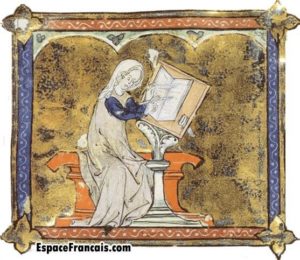

Consider "Milun," where the titular knight stays passive in pursuing his pure love because he is too vainly obsessed with his own reputation. Yet several of the lays also indicate how courtly virtues lead to selfishness and self-glorification that cause great pain later. Knights are praised by the narrator for their prowess on the field, tournaments are lauded as the height of showmanship and enjoyment, and pursuit of women by courtly knights is taken to be worthwhile and virtuous. Marie's work is written for a courtly audience much devoted to the rules and art of chivalry, and as such seems to glorify it. How does Marie criticize chivalry while also relishing it? Again, Marie's work does not easily fall into one pattern, though one can link the ending of a lay to the type of love represented therein. There are certainly examples where primarily selfless lovers come to poor ends, like "Yonec," but this is tempered by their son Yonec's revenge, which is their redemption. On the other hand, "Bisclavret" ends poorly for the selfish wife while Bisclavret himself is redeemed by the love and trust of his lord. "Le Fresne" is the happiest and most triumphant of endings, mainly because the girl shows such selflessness. Marie tends to approve of selfless love with some kind of happy ending, whereas selfish love leads to an unhappy or tragic ending. The answer to this question is based around the type of love represented. Why do some lays have tragic endings, while some have happy endings? The best answer is that Marie is a pragmatist – while love can transcend the ugly world, it requires great sacrifice of that public world to survive, as in "Eliduc." Consider "Chaitivel" or "Guigemar" as examples. However, one could also argue that Marie is an optimist in her belief that love can transcend the ugliness of the world. Or there are lovers who exhibit selfish behavior, like in "Equitan" or "Chaitivel," suggesting Marie does not think much of humanity. Consider "Les Deus Amanz" or "Yonec" to see lovers who cannot stay alive and happy when placed in the public, social world. There are certainly myriad examples of lovers who find a pure love, but that love is thwarted by the world. It is easiest to argue Marie is a pessimist.


One could certainly argue this either way, considering how the messages of Marie's lays tend to contradict themselves rather than conforming to a single moral. Would you consider Marie an optimist or a pessimist? Explain.


 0 kommentar(er)
0 kommentar(er)
